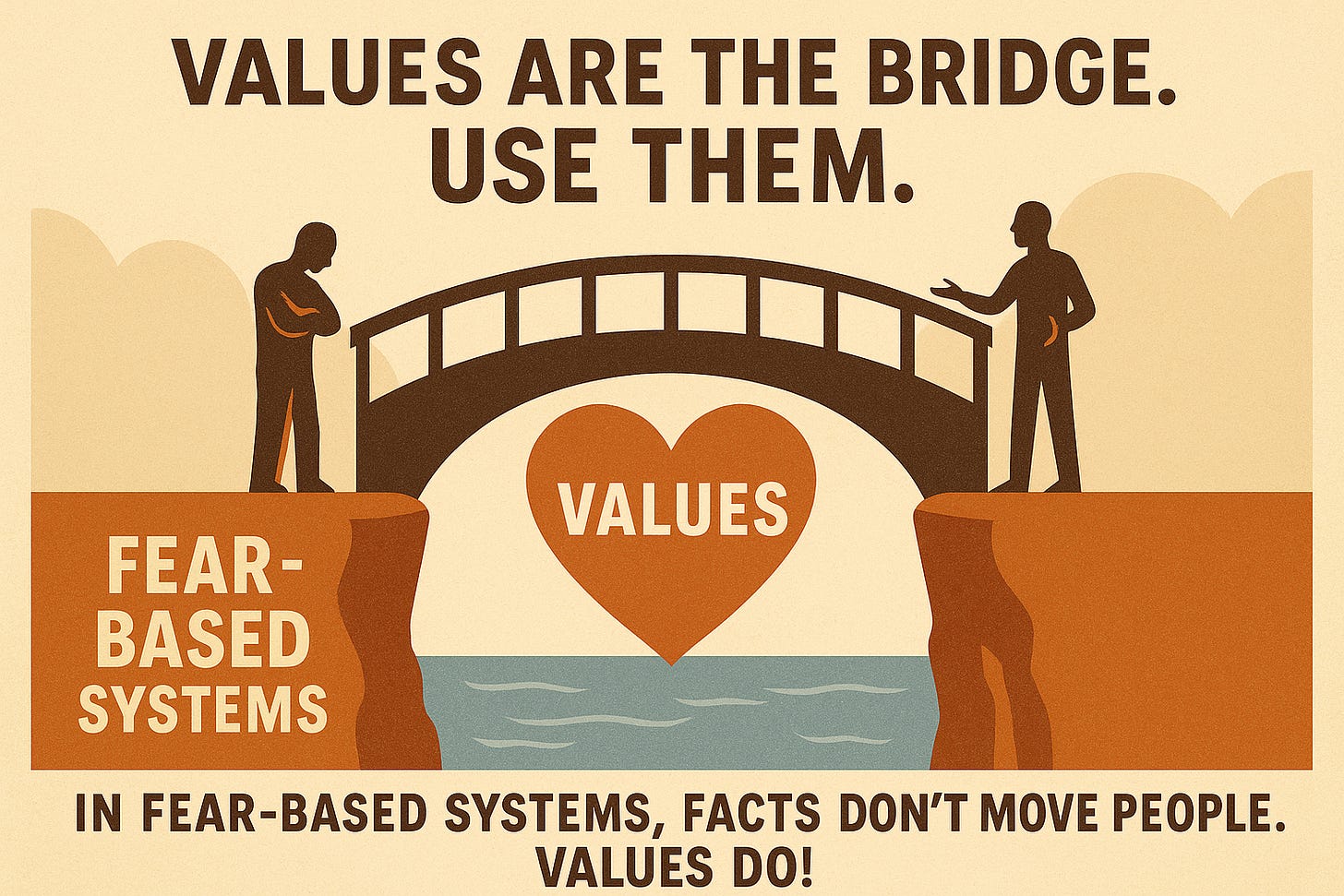Lesson 6: Values Are the Bridge. Use Them.
Ten Lessons for the Resistance in a Fear-Based System
In fear-based systems, facts don’t move people.
Values do.
That’s not a theory. It’s something I’ve seen over and over — in Belarus, Ukraine, Georgia, and yes, even in parts of America now.
Authoritarian systems don’t survive on raw force alone. They survive because they redefine loyalty around fear, and detach people from the values that make democratic culture possible.
In 2025, we’re watching this unfold in real time. But here’s the good news: people across the political spectrum still live their lives by values that align far more with democracy than authoritarianism. Our job is to help them see that.
What I Wrote Then — and Why It Matters More Now
In The Battle for Democracy, I wrote:
“Opposition groups may have strategic and tactical differences, but they are unified around a common set of values. People who oppose fear-based regimes do so because, consciously or not, they recognize those regimes don’t reflect the values they live by.”
That’s what the authoritarian movement fears:
Shared values.
Because when people realize their values—fairness, honesty, responsibility, and dignity - aren’t being represented by those in power, they start to act.
The challenge is helping them make that connection, without shame, blame, or lectures.
What This Looks Like
Serbia (2000): Otpor’s message wasn’t just “Milosevic must go.” It was “We deserve better.” They spoke to youth, dignity, and freedom, not policy.
Ukraine (2004): The Orange Revolution’s moral appeal wasn’t about NATO or economics. It was about being seen as citizens who mattered.
The U.S. (2025): The Autocratic Forces have wrapped their movement in values language — patriotism, tradition, faith, freedom — even as they undermine each of those ideas. Unless we respond in values-based terms ourselves, we’re just arguing facts into a void.
Three Things You Can Do Today
1. Lead with values, not policy or stats.
Since 2022, I’ve helped lead long-term survey research for the Lincoln Democracy Institute. We’ve tracked what 4,000 Americans say guides their daily lives. Here are the top four values they say matter most, across all political affiliations:
| Value | Republican | Democrat | Independent |
|-----------------|------------|----------|-------------|
| Honesty | 41.2% | 40.9% | 43.0% |
| Responsibility | 36.9% | 36.1% | 36.4% |
| Family | 35.7% | 34.3% | 37.7% |
| Respect | 29.9% | 35.5% | 33.1% |These values transcend polarization.
They are our opening.
2. Use contradictions — not confrontation — to open eyes.
In 2025, examples abound: veterans losing care under Trump’s DOGE agency, small businesses crushed while mega-corporations dodge taxes. When people who value service, fairness, and hard work see these contradictions, they begin to question. Let them get there—with your help, not your judgment.
3. Share stories that reflect the best in us.
Facts are forgettable. Stories shape belief. Share what democracy looks like when it works — people helping each other, speaking up, resisting together. Give people something to want to be part of.
Bottom Line
Authoritarians erode democracy by isolating people from their values — and by mocking the idea that we still share any.
They win when people say, “We’re too divided.”
They lose when we demonstrate that shared values still exist—and still matter.
So remind people of what they believe in.
Not to shame them.
But to invite them back into something bigger than fear.
Because values are the bridge.
They always have been.
And right now, they’re the best tool we have.
Next Up:
Lesson 7 — Authoritarians Exploit Identity. Opponents Must Transcend It.
Why autocrats divide people by race, class, geography, and grievance — and how successful resistance movements build a bigger “we” that crosses those lines.




I know you said it’s not the time for poetry but “Values are the Bridge. Use Them”, rings like poetry to me. Values put into words do matter when reaching out across that bridge. The value of honesty struck me. Still dealing with “both-side-ism” on the honesty front with some. What a tangle that conversation can be—so like who’s on first—but not funny. Your lessons help. They give me hope that the bridge can be crossed. As always, thanks, and enjoy this day.
Thank you!